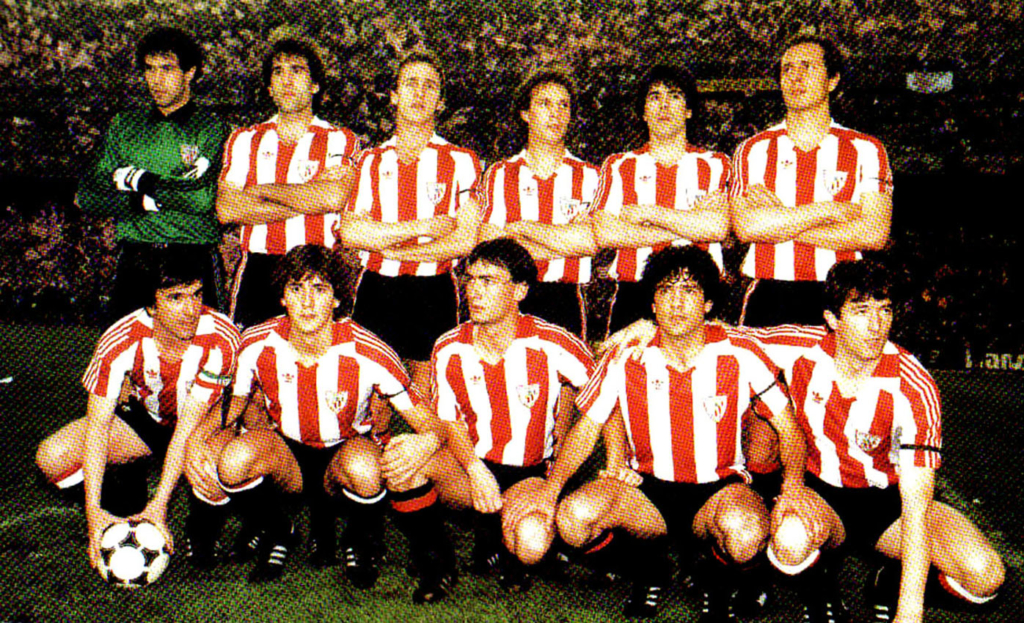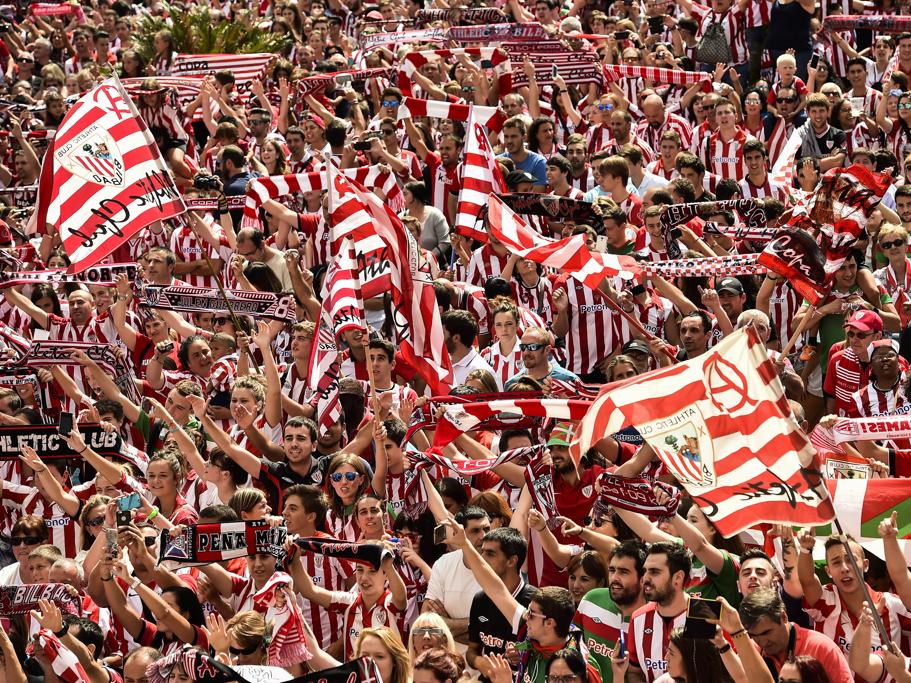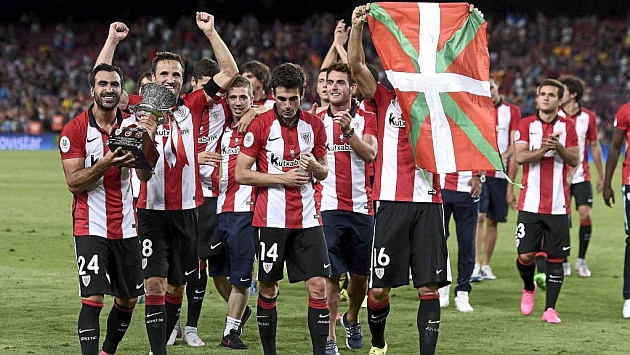Athletic Bilbao: The club which does things differently

Athletic Club play Barcelona in their second ‘Copa Del Rey’ final in two weeks on Saturday [17 April]. Ben Wray, Bella Caledonia’s European Feature Writer, examines the Bilbao club’s unique policy of only having Basque players in their team, and asks whether this tradition is a help or a hindrance in the globalised big business world which is modern football?
Athletic Club, the first football club to play two finals of the same tournament in two weeks, is not your standard team. Every first-team player either came through Athletic’s youth system or the youth system of another club in the seven historic provinces of ‘Euskal Herria’, or was born there.
In Europe, this is a unique policy for a professional team in the modern age. Only one other major club internationally, Chivas de Guadalajara in Mexico, still has a similar approach. Athletic even have an old saying to sum it up: “Con cantera y afición, no hace falta importación” (“With home-grown talent and fans, there is no need for imports”).
The ‘Cantera’ youth policy is controversial, both politically and in terms of its sporting effectiveness. In the first of two ‘Copa Del Rey’ finals on 3 April – delayed for a year due to the pandemic – Athletic lost against Basque rivals Real Sociedad, a team which used to have the same home-grown players policy, but ditched it in 1989 to purchase John Aldridge from Liverpool for £1 million.
With the likes of David Silva, from the Canary Islands, and Alexander Isak, from Sweden, ‘La Real’ showed a higher level of technical ability in the all-Basque final, in what was a fairly comfortable 1-0 victory. The defeat meant Athletic’s 37-year wait for a major trophy has been extended by at least another two weeks.
Is the Cantera policy holding Athletic back in the modern age, or is it an example to follow for clubs looking for a more sustainable model of success?

‘There is no dichotomy between the social and sporting dimension’
For Mikel ‘Betelu’ Alvarez, a trade union organiser in Bilbao and a committed Athletic supporter, the Cantera policy is successful on every level.
“There is no dichotomy between the social and sporting dimension of the club,” Alvarez says. “On the contrary, the sporting dimension is also strengthened by the youth policy, as it makes the first team players feel more identified with the club and compete in a different way. This also happens when the public identifies more with the players, which makes the environmental pressure and the sporting environment have an added value.”
There is certainly a strong case to be made for the success of Athletic’s Cantera, despite the lack of major trophies. The club has been ever-present in the top division of Spanish football, a feat only matched by Barcelona and Real Madrid. The Cantera policy has produced a consistency of sporting achievement which other clubs that have embraced a more boom and bust approach to success cannot match.
Antonio Camacho, author of ‘Athletic Bilbao, 1898-2020: A Basque identity club in the era of hypercapitalist and globalised football’, says that the Galician team Deportivo de la Coruña is one example of a Spanish club which, like Icarus, ignored warnings and flew too close to the sun. Deportivo won La Liga in 1999-2000, the Copa Del Rey twice and regularly appeared at the latter stages of the Champions League at the turn of the millennium, but by 2013 the club was on the verge of insolvency. The administrators opened the books and found a “reckless and misguided business model”. The club are now in the fourth tier of Spanish football and at risk of dissolution.
“To fight against football’s super-rich is very difficult,” Camacho finds. “There are teams like Deportivo which adapted fully to capitalist modernity, had great results, and then they have lost. And I would say not only are they no longer competitive on a sporting level, but they have lost their identity as well.
“Athletic’s project is not to try to be in European football’s super-oligarchy, and I think it is a realistic alternative.”
Indeed, Athletic admit on their own website that an “unbridgeable gap” has opened up between themselves and Real Madrid and Barcelona, but that is “put into perspective when we consider the way in which these two teams have achieved their results, rather than the results themselves”. Athletic are competing on unequal terms, in their own way.
The club spent €43 million on transfers over the past three seasons, compared to €513 million at Real Madrid and €530 million at Barcelona. Athletic have the most players in the first-team who were developed through their own youth set-up, the famed ‘Lezama’ academy, in La Liga, 18, compared to just four at Real Madrid and six at Barcelona. Bilbao aren’t challenging for La Liga and Champions League titles, but they are still competing in the top league, were in a Uefa Cup final in 2012 (they lost 3-0 to Atletico Madrid) and have reached the 2019/20 and 2020/21 Copa Del Rey finals. There are plenty of less successful clubs.
And what is lost from not splashing the cash on transfers for top talent from around the world is gained in a bigger budget to invest in youth development, funding the women’s team (one of the most successful in Spain) and on the stadium. The new San Mamés stadium was finished in 2013, sits right in the centre of Bilbao, a one-club city, and is the eighth largest in the country, holding 53,000. Before the pandemic stopped fan attendance, it was consistently packed out, with Athletic supporters known as among the most passionate in Spain. Even youth team matches can draw crowds of 10,000.
Alvarez, who is also a member of ‘Eragin’, an assembly for young precarious workers in Bilbao, argues that key to this special relationship between club and fans is the players.
”The entire squad has been brought up close to the conflicts, concerns and struggles of this country,” he says.
Alvarez cites recent examples: one player publicly supported an ongoing indefinite strike at a steel pipe manufacturing factory in the Basque Country, while another called for participation in the ‘Aberri Eguna’, the day of the Basque homeland, on 4 April.
Rootedness appears to inspire fan and player commitment; Athletic is a club to be part of, rather than just a product to be consumed.

“In the future citizens will revolt against us”
Of course, there is another side to the Cantera policy, one which is exceedingly favourable for Athletic’s players: their salaries are very high, even by modern football standards. Bilbao’s players are the sixth best paid in the league, but the team have only finished inside the top six in three of the past ten seasons. Keeping top Basque talent at the club requires both love and money, it seems.
There are also other ways in which the club has embraced the orthodoxies of neoliberalism: the company was one of the last major clubs to not have a sponsor on the front of their shirts, until 2008 when they agreed a sponsorship deal with Basque oil firm Petronor. And workers at the San Mamés do not all receive the same lavish treatment as the players: stadium cleaners joined a Basque general strike in January 2020 over the “precariousness” of their conditions, complaining of their jobs being outsourced and the club even denying them the right to strike in the past.
Alvarez accepts that the club “is part of modern football and all the business that has been generated since the entry of big capital in the interests that surround this sport”. He also questions whether the club uses its huge influence in the city as much as it has in the past for social good, instead “limiting itself on too many occasions to being the mirror of society”.
Nonetheless, Alvarez points out, Athletic is one of just four clubs in Spain still to be owned by its members, which acts to “shield the club from financial investors that might be tempted to buy it and use Athletic as another financial asset”.
It is not difficult to see where this concern comes from when surveying the map of European football ownership today. Paris St Germain has been bankrolled by the Qatari state, Manchester City by the United Arab Emirates, and Newcastle United came perilously close to being the property of Saudi despot Crown Prince Mohammed Bin Salman (Salman even called up Boris Johnson to ‘correct’ the Premier League’s decision to prevent the takeover). Even such a football establishment figure as Arsene Wenger has complained in the past of some club’s having “unlimited resources”, and more recently stated that elite clubs like Barcelona are too big to fail, and will ultimately be protected by nation-states.
Meanwhile, at the base of the football pyramid, hundreds of clubs across Europe are at risk of going bust in the Covid crisis as fans still cannot attend on match day’s, a complete loss of their main source of revenue. As broadcasting money drains out of the game in astronomical player wages and absurd agent fees, at the grassroots level pitches are being sold off to keep the debtors at bay.
“In the future the citizens will revolt against us, because we live in a privileged world,” Wenger added.
Cantera, immigration and racism
Athletic, like many football club’s, has its roots in the emergence of the industrial working class. The club was set-up by migrant English miners and shipyard workers in 1898, hence ‘Athletic’ rather than ‘Atletico’. (Under General Francisco Franco’s dictatorship, the club was forced to change its name to Atletico, but it soon changed it back following his death.) In 1911 the club first fielded only home grown players after a dispute with Real Sociedad over ineligible English players. Uniquely, the tradition has stayed the course for the 110 years since then, and has very few critics in and around the club.
That may be a surprise, considering the Cantera policy excludes anyone from the team who didn’t come through a Basque youth system or is Basque, but the club strongly refutes any claims of xenophobia, pointing to the fact that any child who migrates to the Basque Country from anywhere in the world can put on the red and white stripes. The policy is pro-youth development, not anti-foreigner, defenders of the Cantera insist.
Historically, the Basque Country has had a small immigrant population, and thus Athletic’s policy meant the club had the ignominy of being the last in La Liga to field a black player, in 2011. However, as Basque society slowly becomes more ethnically diverse, so too does Athletic’s team. Star striker Iñaki Williams, born in Bilbao to a Ghanian mother and Liberian father, became the first black goalscorer for the club in 2015. There are now a number of black youth players in Athletic’s academy, which the club have had to defend from racism on social media. A more high profile incident occurred in January 2020 when Williams was the subject of racist abuse from the fans of Catalan team Espanyol. Williams said the whole team would walk off the pitch together if it happens again.
And as migration patterns in Europe become increasingly fluid with workers moving from east to west and back again in search for work, children who have lived in Euskal Herria for a short period of time are expanding the limits of Athletic’s policy. Cristian Ganea, who was born in Romania and began playing for Romanian clubs, was signed for Athletic on the basis that he spent his teenage years in the Basque town of Basauri and had featured for one of Athletic’s local feeder clubs.
The Cantera policy has never been made official by the club, probably because if it was it could be legally challenged in court on the basis of labour discrimination. While there may be something in that, the social class context is important here: the labour market for top-end football players – an extremely privileged group – can’t be compared to the situation of cleaners or construction workers, where migrating to find work and earn for their family can be a matter of life or death. There is social value in a youth-focused system that shuns the circus of football’s international transfer market.
Athletic: a model to follow?
The pandemic has deflated the bubble of football’s long growth cycle, a transformation in fortunes that many clubs thought was not possible, and had not planned for. Suddenly, transfer budgets are slim and clubs want to get expensive paid players off their books. Could the crisis of the pandemic lead other clubs in Europe to look to Athletic’s policy for inspiration, as Rory Smith of the New York Times has suggested?
“I think it would be possible,” Camacho says, “but you have to remember that in Athletic the Basque identity is very strong. Maybe other nation’s with a small population like the Basque Country – the Portuguese, the Belgians, or the Scots – could do it, but it depends on the strength of the national identity in each country, and the willingness to resist business interests. Because remember this policy is not good for the super-agents who make money from transfers.
For Alvarez, he hopes that Athletic’s “rootedness to the land and to the humble classes of Euskal Herria” can act as an inspiration, to show that “with all the contradictions that may exist, the sporting and social challenges of the 21st century can be approached in a different way”.
To prove the power of Athletic’s Cantera, a cup final win would do no harm. All they have to do is defeat Lionel Messi’s Barcelona.

What an interesting article thanks.
Something to which I am only faintly aware.
I thought this was a crucial paragraph though
“Of course, there is another side to the Cantera policy, one which is exceedingly favourable for Athletic’s players: their salaries are very high, even by modern football standards. Bilbao’s players are the sixth best paid in the league, but the team have only finished inside the top six in three of the past ten seasons. Keeping top Basque talent at the club requires both love and money, it seems”
It seems the money is doing the talking.
Dundee United pursued a ‘cantera’ policy during its period of success in the 1980s. The terms and conditions into which the business locked its playing staff were poor, compared to those enjoyed by workers at other equivalent businesses in Scotland.
Glasgow Rangers also employed a similar ‘blud und ehre’ policy at the time, until the advent of the Souness revolution.
Al Jazeera has a documentary series called Football Rebels which touch on a lot of the social and political sides of the game.
https://www.aljazeera.com/program/football-rebels
I have only watched the one on Honey Thaljieh: First captain of Palestine women’s football team, so far, which brings up the question of women’s football. I gather there is an Athletic Club Femenino, been going for some years, with the same Cantera policy?
Another aspect, prompted by watching BBC’s recent documentary series Football’s Darkest Secret, the Scottish Football Association’s recent report sexual abuse, and the investigations of IICSA, is what the relevant story is in Spain, the Basque country and Athletic Bilbao? According to the BBC documentary, a main reason given by club management (in unguarded moments) for keeping on abusive coaches was that they brought results, translating into financial success for the club. Would the Cantera policy make such abuses less likely as a result? Or perhaps there are other aspects that make speaking out more difficult? Or maybe fewer isolated and vulnerable young players?
In the final of the Copa del Rey, Athletic lost 4 – 0 to Barcelona. The goals were scored by a Frenchman, a Dutchman and an Argentinian. ‘Rarely, can a final have been so one-sided’, according to Sid Lowe in the Guardian.
Realistically, Athletic will never win La Liga again. In some respects, their policy is admirable but another adjective – Spanish not Basque – comes to mind; quixotic.
The Basque cognate of the Spanish ‘quijotesco’ is ‘kixotikoa’. ‘Quixotic’ is an English adjective.